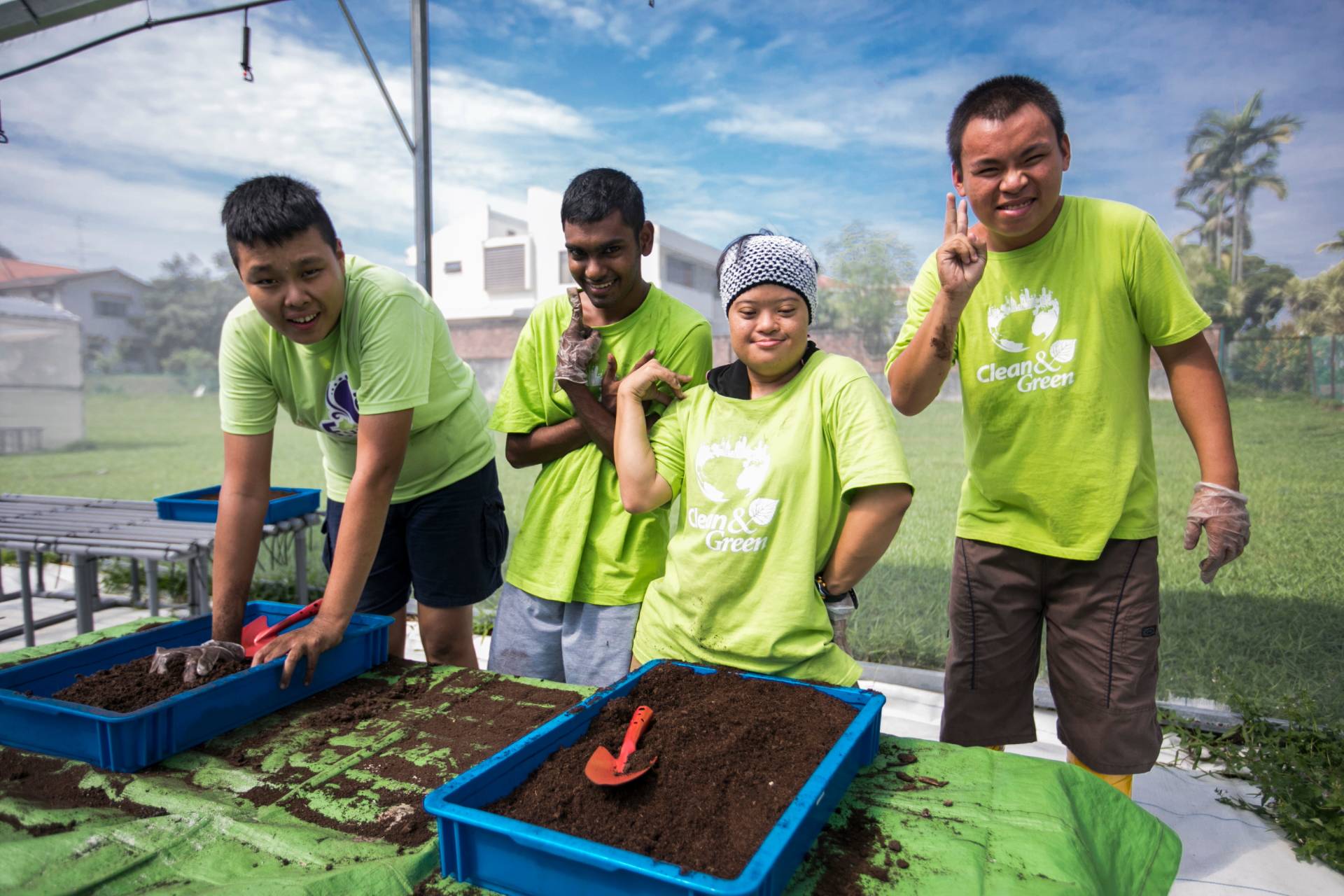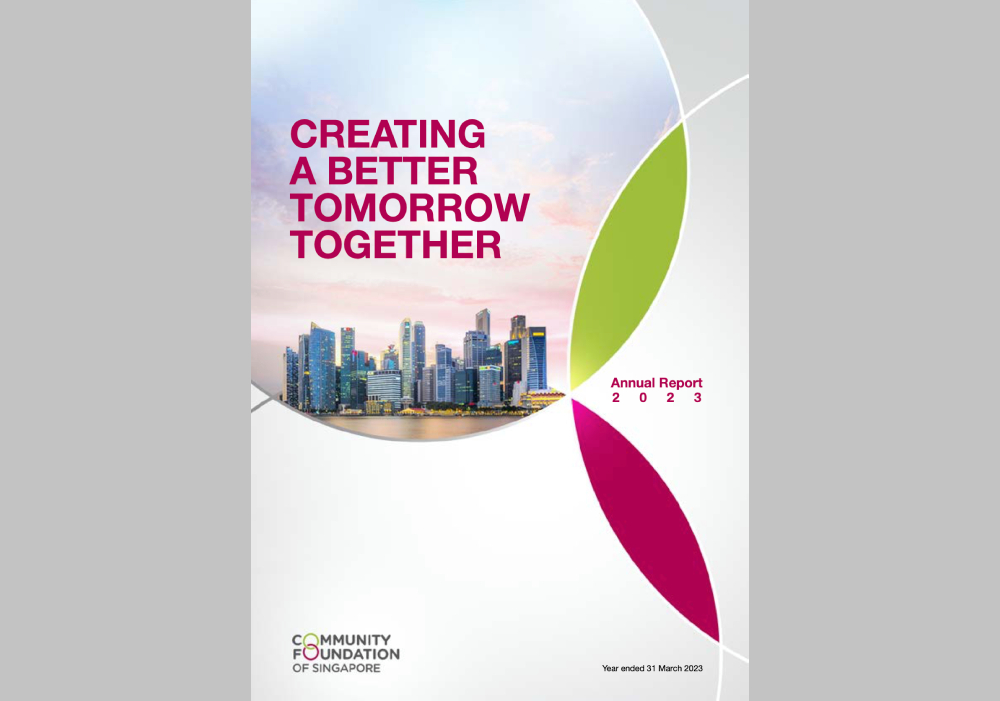Four critical gaps in improving employability for all


A person in a wheelchair with much to give. A stay-at-home mum who misses working. An ex-offender who yearns for a second chance. A senior forced to retire early. These are some examples of people who want to work. They believe they can contribute to society. They also deserve the basic right to work and should not be denied from doing so.
Yet, many of them face difficulties in securing decent jobs. In recent years, the gig economy opened up opportunities for individuals facing barriers to traditional employment or those who need flexibility. However, gig work comes with its own set of challenges, such as unstable income and a lack of employment benefits.
Through our years on the ground partnering with local charities, social service agencies and research organisations, we at CFS have identified four groups – ex-inmates, persons with disabilities (PWDs), seniors, and women – that face challenges in securing gainful employment due to bias, unfair practices, or lack of accessibility. This, in turn, can lock them and their families in a vicious cycle of hardship.
Employment needs to become more inclusive and provide fair opportunities to everyone. In Singapore, workplace anti-discrimination guidelines are being enshrined into law, but there is still more work to be done. This is where philanthropy can make a significant difference. At CFS, we connect donors with charities and programmes that uplift the employability of marginalised people.
We work with charities that build awareness of individual and structural barriers in the workplace and advocate for change. They are also empowering disenfranchised job seekers by providing skills training, job matching, mentoring and more. Read on to learn about the realities faced by disadvantaged people and how you can help.
Building Disability-Inclusive Workplaces
About 15 per cent of the global population, or over one billion individuals, have a disability. This makes persons with disabilities (PWDs) one of the world’s biggest minority groups (World Bank, 2023). In Singapore, only 30 per cent of PWDs of working age are employed. The government hopes to raise this figure to 40 per cent by 2030 (The Straits Times, 17 August 2022). Barriers include the prevailing bias that disabled people are less productive and troublesome to accommodate in the workplace.
Organisations like the Tripartite Alliance for Fair and Progressive Employment Practices (TAFEP) and SG Enable, an agency for disability, are striving to change attitudes and help employers create disability-friendly workplaces. Companies are also encouraged to open up work-from-home opportunities to those who are less mobile. Hiring more PWDs and giving them meaningful careers will translate to overall gains in labour force productivity for Singapore going forward.
Attracting Female Talent to Close the Gender Gap
Better education and changes in attitudes towards gender-based roles have paved the way for more women to have careers. Between 2012 and 2021, Singapore’s female labour force participation grew from 57.7 per cent to 64.2 per cent. However, it still remains lower than men’s at 77.2 per cent (Statista).
The gender gap emerges when women enter their 30s. This is typically the age when they assume more care responsibilities (Ministry of Manpower, 2022). Women continue to bear the brunt of caregiving and domestic responsibilities while juggling work. The gap, unfortunately, widens over time. Taking time off work can complicate re-entry into the workplace, creating knock-on effects throughout a women’s career.
Yet, there is a clear business imperative to leveraging female talent. Gender diversity benefits companies as women often contribute different skills and perspectives, boosting growth, innovation, and productivity (International Monetary Fund, 2018).
While a growing number of organisations are waking up to this, there is much more room for female-friendly recruitment and retention practices. This includes flexible working arrangements, opportunities for progression and leadership, and help for mothers returning to work.
Reintegrating Ex-offenders into the Economy
Ex-offenders are among the most marginalised and stigmatised people in our community. They face unique challenges in finding and sustaining gainful employment. Just 53 per cent of ex-offenders found jobs three months after their release – a figure that has stayed stagnant between 2017 and 2019 (Ministry of Home Affairs, 2020).
One reason is that ex-offenders who spend long periods in jail may not have the skills that are in demand, such as digital expertise. Moreover, with their limited social networks, they tend to be disconnected from market trends, knowledge of training opportunities and subsidies. That instantly puts them on a weaker footing.
Progress has been made through the Ministry of Home Affairs’ Employment Preparation Scheme, which allows ex-offenders to attend training and educational activities outside of prison during their sentences. But more can be done to help ex-offenders avoid a vicious circle. Without good jobs and long-term employment prospects, it will be harder for ex-offenders to rebuild their lives, placing them at a high risk of reoffending.
Addressing Age-Based Employment Discrimination
Three in four workers in Singapore do not intend to retire before 65 (The Straits Times, 3 July 2022). For many older people, working provides income and purpose and bolsters their physical and mental well-being.
Despite this, age was cited as the top reason for prejudice towards older jobseekers in a Ministry of Manpower survey (Today, 23 March 2022). Older people are stereotyped as “slow” and “less trainable”. Some may be less educated, putting them at risk of being displaced by technology. Employers may prefer to train younger employees, who are seen as having more room to grow.
The issue is especially pressing as Singapore is fast becoming a super-aged society. While upcoming anti-discrimination laws will help, companies should also take the lead and build a multigenerational workforce. Older workers bring experience and a diversity of views to the table, which will be a source of strength.
How You Can Help
With your generosity, you could help fund programmes that improve the employability of disadvantaged Singaporeans struggling to find work. As a cause-neutral philanthropic advisor, CFS is well-placed to help you navigate the various programmes available and tailor a giving plan based on your goals and interests.
Efforts to address barriers to employment fall into three broad areas:
- Development of skillsets (educational, technical/vocational training, and soft skills development)
- Exposure to career pathways (employer engagement and career support)
- Encouraging sustainable careers (getting supervisors and colleagues to accommodate marginalised individuals)
The simplest and most cost-effective way to help fund different programmes that tackle employability is by setting up a donor-advised fund (DAF). An individual, a beneficiary of a will, a trust, or a family office can set up a DAF. CFS will handle all fund administration and leverage our experience and network to ensure your giving is targeted, accountable and impactful.
As a donor, you will save on legal expenses and enjoy upfront tax deductions at the prevailing rate on eligible donations. Donors will also receive regular statements tracking incoming donations to their DAF and outgoing disbursements to charities. CFS has an established track record when it comes to setting up DAFs. CFS is the first to bring in DAFs into Singapore and is currently the largest provider with over 220 DAFs and Community Impact Funds.
If you would like to begin your giving journey with CFS, do get in touch with us.
References
International Monetary Fund. (28 November 2018). Economic Gains from Gender Inclusion: Even Greater than You Thought. https://www.imf.org/en/Blogs/Articles/2018/11/28/blog-economic-gains-from-gender-inclusion-even-greater-than-you-thought
Ministry of Home Affairs. (14 October 2020). Written Reply to Parliamentary Question on the Employment Rate of Ex-offenders, by Mr K Shanmugam, Minister for Home Affairs and Minister for Law. https://www.mha.gov.sg/mediaroom/parliamentary/written-reply-to-parliamentary-question-on-the-employment-rate-of-ex-offenders-by-mr-k-shanmugam-minister-for-home-affairs-and-minister-for-law/
Ministry of Manpower. (1 December 2022). Summary Table: Labour Force. https://stats.mom.gov.sg/Pages/Labour-Force-Summary-Table.aspx
Statista. Labor force participation rate of women in Singapore from 2012 to 2021. https://www.statista.com/statistics/951113/singapore-female-labor-force-participation-rate/
The Straits Times. (17 August 2022). Singapore aims to have 40% of working-age persons with disabilities employed by 2030. https://www.straitstimes.com/singapore/singapore-aims-to-have-40-per-cent-of-working-age-persons-with-disabilities-employed-by-2030
The Straits Times. (3 July 2022). 3 in 4 older workers don’t intend to retire before 65; reasons include staying active, having purpose. https://www.straitstimes.com/singapore/jobs/3-in-4-older-workers-dont-intend-to-retire-before-65-reasons-include-staying-active-having-purpose
Today. (23 March 2022). Discrimination against workers and jobseekers declined, but ageism still prevalent: MOM survey. https://www.todayonline.com/singapore/discrimination-workers-jobseekers-declined-ageism-prevalent-mom-survey-1851551
World Bank. (3 April 2023). Disability Inclusion.
https://www.worldbank.org/en/topic/disability#:~:text=Persons%20with%20disabilities%2C%20on%20average,outcomes%20than%20persons%20without%20disabilities.&text=Results-,One%20billion%20people%2C%20or%2015%25%20of%20the%20world’s%20population%2C,is%20higher%20for%20developing%20countries.
A person in a wheelchair with much to give. A stay-at-home mum who misses working. An ex-offender who yearns for a second chance. A senior forced to retire early. These are some examples of people who want to work. They believe they can contribute to society. They also deserve the basic right to work and should not be denied from doing so.
Yet, many of them face difficulties in securing decent jobs. In recent years, the gig economy opened up opportunities for individuals facing barriers to traditional employment or those who need flexibility. However, gig work comes with its own set of challenges, such as unstable income and a lack of employment benefits.
Through our years on the ground partnering with local charities, social service agencies and research organisations, we at CFS have identified four groups – ex-inmates, persons with disabilities (PWDs), seniors, and women – that face challenges in securing gainful employment due to bias, unfair practices, or lack of accessibility. This, in turn, can lock them and their families in a vicious cycle of hardship.
Employment needs to become more inclusive and provide fair opportunities to everyone. In Singapore, workplace anti-discrimination guidelines are being enshrined into law, but there is still more work to be done. This is where philanthropy can make a significant difference. At CFS, we connect donors with charities and programmes that uplift the employability of marginalised people.
We work with charities that build awareness of individual and structural barriers in the workplace and advocate for change. They are also empowering disenfranchised job seekers by providing skills training, job matching, mentoring and more. Read on to learn about the realities faced by disadvantaged people and how you can help.
Building Disability-Inclusive Workplaces
About 15 per cent of the global population, or over one billion individuals, have a disability. This makes persons with disabilities (PWDs) one of the world’s biggest minority groups (World Bank, 2023). In Singapore, only 30 per cent of PWDs of working age are employed. The government hopes to raise this figure to 40 per cent by 2030 (The Straits Times, 17 August 2022). Barriers include the prevailing bias that disabled people are less productive and troublesome to accommodate in the workplace.
Organisations like the Tripartite Alliance for Fair and Progressive Employment Practices (TAFEP) and SG Enable, an agency for disability, are striving to change attitudes and help employers create disability-friendly workplaces. Companies are also encouraged to open up work-from-home opportunities to those who are less mobile. Hiring more PWDs and giving them meaningful careers will translate to overall gains in labour force productivity for Singapore going forward.
Attracting Female Talent to Close the Gender Gap
Better education and changes in attitudes towards gender-based roles have paved the way for more women to have careers. Between 2012 and 2021, Singapore’s female labour force participation grew from 57.7 per cent to 64.2 per cent. However, it still remains lower than men’s at 77.2 per cent (Statista).
The gender gap emerges when women enter their 30s. This is typically the age when they assume more care responsibilities (Ministry of Manpower, 2022). Women continue to bear the brunt of caregiving and domestic responsibilities while juggling work. The gap, unfortunately, widens over time. Taking time off work can complicate re-entry into the workplace, creating knock-on effects throughout a women’s career.
Yet, there is a clear business imperative to leveraging female talent. Gender diversity benefits companies as women often contribute different skills and perspectives, boosting growth, innovation, and productivity (International Monetary Fund, 2018).
While a growing number of organisations are waking up to this, there is much more room for female-friendly recruitment and retention practices. This includes flexible working arrangements, opportunities for progression and leadership, and help for mothers returning to work.
Reintegrating Ex-offenders into the Economy
Ex-offenders are among the most marginalised and stigmatised people in our community. They face unique challenges in finding and sustaining gainful employment. Just 53 per cent of ex-offenders found jobs three months after their release – a figure that has stayed stagnant between 2017 and 2019 (Ministry of Home Affairs, 2020).
One reason is that ex-offenders who spend long periods in jail may not have the skills that are in demand, such as digital expertise. Moreover, with their limited social networks, they tend to be disconnected from market trends, knowledge of training opportunities and subsidies. That instantly puts them on a weaker footing.
Progress has been made through the Ministry of Home Affairs’ Employment Preparation Scheme, which allows ex-offenders to attend training and educational activities outside of prison during their sentences. But more can be done to help ex-offenders avoid a vicious circle. Without good jobs and long-term employment prospects, it will be harder for ex-offenders to rebuild their lives, placing them at a high risk of reoffending.
Addressing Age-Based Employment Discrimination
Three in four workers in Singapore do not intend to retire before 65 (The Straits Times, 3 July 2022). For many older people, working provides income and purpose and bolsters their physical and mental well-being.
Despite this, age was cited as the top reason for prejudice towards older jobseekers in a Ministry of Manpower survey (Today, 23 March 2022). Older people are stereotyped as “slow” and “less trainable”. Some may be less educated, putting them at risk of being displaced by technology. Employers may prefer to train younger employees, who are seen as having more room to grow.
The issue is especially pressing as Singapore is fast becoming a super-aged society. While upcoming anti-discrimination laws will help, companies should also take the lead and build a multigenerational workforce. Older workers bring experience and a diversity of views to the table, which will be a source of strength.
How You Can Help
With your generosity, you could help fund programmes that improve the employability of disadvantaged Singaporeans struggling to find work. As a cause-neutral philanthropic advisor, CFS is well-placed to help you navigate the various programmes available and tailor a giving plan based on your goals and interests.
Efforts to address barriers to employment fall into three broad areas:
- Development of skillsets (educational, technical/vocational training, and soft skills development)
- Exposure to career pathways (employer engagement and career support)
- Encouraging sustainable careers (getting supervisors and colleagues to accommodate marginalised individuals)
The simplest and most cost-effective way to help fund different programmes that tackle employability is by setting up a donor-advised fund (DAF). An individual, a beneficiary of a will, a trust, or a family office can set up a DAF. CFS will handle all fund administration and leverage our experience and network to ensure your giving is targeted, accountable and impactful.
As a donor, you will save on legal expenses and enjoy upfront tax deductions at the prevailing rate on eligible donations. Donors will also receive regular statements tracking incoming donations to their DAF and outgoing disbursements to charities. CFS has an established track record when it comes to setting up DAFs. CFS is the first to bring in DAFs into Singapore and is currently the largest provider with over 220 DAFs and Community Impact Funds.
If you would like to begin your giving journey with CFS, do get in touch with us.
References
International Monetary Fund. (28 November 2018). Economic Gains from Gender Inclusion: Even Greater than You Thought. https://www.imf.org/en/Blogs/Articles/2018/11/28/blog-economic-gains-from-gender-inclusion-even-greater-than-you-thought
Ministry of Home Affairs. (14 October 2020). Written Reply to Parliamentary Question on the Employment Rate of Ex-offenders, by Mr K Shanmugam, Minister for Home Affairs and Minister for Law. https://www.mha.gov.sg/mediaroom/parliamentary/written-reply-to-parliamentary-question-on-the-employment-rate-of-ex-offenders-by-mr-k-shanmugam-minister-for-home-affairs-and-minister-for-law/
Ministry of Manpower. (1 December 2022). Summary Table: Labour Force. https://stats.mom.gov.sg/Pages/Labour-Force-Summary-Table.aspx
Statista. Labor force participation rate of women in Singapore from 2012 to 2021. https://www.statista.com/statistics/951113/singapore-female-labor-force-participation-rate/
The Straits Times. (17 August 2022). Singapore aims to have 40% of working-age persons with disabilities employed by 2030. https://www.straitstimes.com/singapore/singapore-aims-to-have-40-per-cent-of-working-age-persons-with-disabilities-employed-by-2030
The Straits Times. (3 July 2022). 3 in 4 older workers don’t intend to retire before 65; reasons include staying active, having purpose. https://www.straitstimes.com/singapore/jobs/3-in-4-older-workers-dont-intend-to-retire-before-65-reasons-include-staying-active-having-purpose
Today. (23 March 2022). Discrimination against workers and jobseekers declined, but ageism still prevalent: MOM survey. https://www.todayonline.com/singapore/discrimination-workers-jobseekers-declined-ageism-prevalent-mom-survey-1851551
World Bank. (3 April 2023). Disability Inclusion.
https://www.worldbank.org/en/topic/disability#:~:text=Persons%20with%20disabilities%2C%20on%20average,outcomes%20than%20persons%20without%20disabilities.&text=Results-,One%20billion%20people%2C%20or%2015%25%20of%20the%20world’s%20population%2C,is%20higher%20for%20developing%20countries.
- Related Topics For You: CHARITY STORIES, DONOR STORIES, DONOR-ADVISED FUND, IMPROVING EMPLOYABILITY, OPINION, PERSONS WITH DISABILITIES, SENIORS



